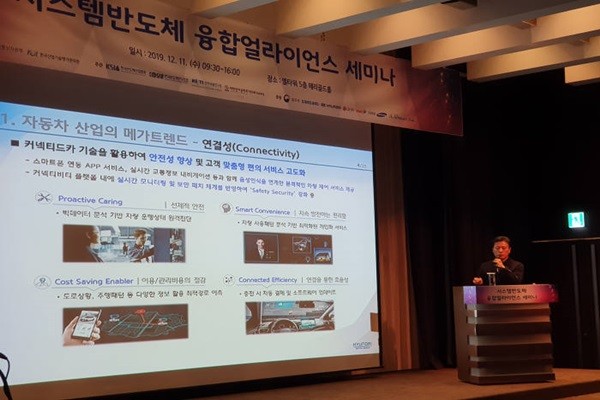Although the automotive semiconductor market is growing rapidly due to development of connectivity as well as electric vehicle battery and self-driving technology, there are criticisms that the level of South Korean semiconductor companies’ technologies are still not up to the mark. This indicates that South Korean Government needs to promote the market, which can be an important business in the future, and promote collaboration between South Korean semiconductor companies and automotive manufacturers.
Team Leader Seo Jung-do of Hyundai Motor Company’s Platform Controller Development Team talked about recent trends within the automotive semiconductor market during ‘System Semiconductor Convergence Alliance Seminar’ that was held at EL Tower on the 11th and emphasized that promotion of South Korea’s system semiconductor market is a must.
Team Leader Seo explained about fierce competitions and M&A taking place within the market. Electric and electronic architectures that are designed to be incorporated into cars are far more advanced compared to 30 years ago. In case of MCU (Micro Controller Unit) that is basically the brain of a car, it was a single-core component that was manufactured through 180nm process in 1990s. However, AI processor that is manufactured through 14nm process has 12 CPUs, 2 GPUs, and 2 intelligent semiconductors integrated into single chip.
When the time to develop a chip started to take longer and the cost to develop a chip started to get more expensive, many companies have started to combine different chips into single ‘unified chip’. Some chip manufacturers are banking on the development of software in order to quickly respond to their customers’ demands. There have been new standards on hardware and software as unfamiliar technologies are starting to appear.
95% of new automotive semiconductors are system semiconductors. MCU that processes and calculates information, sensor that detects images and temperature, and power semiconductor that manages power effectively are few system semiconductors out of 5,000 different types of system semiconductors.
South Korea’s role within the market is insignificant. NXP from Netherland, Infineon from Germany, Renesas from Japan, and Texas Instruments from the U.S. are currently dominating the market.
“While South Korea’s memory semiconductor industry is one of the best in the world, competitive edge in our system semiconductor industry and relevant industries is still weak.” said Team Leader Seo. “We urgently need bold investments from companies, government support, and supply and demand of professional manpower.”

Team Leader Seo especially focused on examples of M&A between companies related to multinational automotive manufacturers that are already taking place actively with the automotive industry. “Just like partnership between NVIDIA and Volvo and Cree and Volkswagen and M&A between chip manufacturers, companies have started to raise their control of the market by supplementing each other’s needs.” said Team Leader Seo.
Hyundai Motor Company is also strengthening its cooperative system with semiconductor companies. It signed a partnership with Infineon in 2007 and it has been sharing key technologies with Infineon ever since.
It is also working with South Korean semiconductor companies in the power semiconductor field that is expected to grow rapidly when electric vehicles become a norm. However, it believes that the degree of completion of these companies’ technologies is not at the level where they can be applied to mass-production.
“South Korean Government needs to make decisive investments so that South Korean semiconductor companies can quickly improve the level of their technologies and start working with automotive manufacturers.” said Team Leader.
The seminar was held as part of South Korean Government’s plan to promote the system semiconductor industry. It also introduced Samsung Electronics’ foundry business, South Korean Government’s plan to promote mutual growth within the semiconductor ecosystem, and LG Electronics’ technologies on sensor.
“System semiconductor is one of key technologies of the Fourth Industrial Revolution and we are going to make contributions towards creating jobs with good quality.” said Yoo Jung-yeol who is the head of Ministry of Trade, Industry and Energy’s Industrial Policy Department during a congratulatory message. “We are going to actively provide our support to establish a cooperative system between buyers and suppliers and to secure next-generation technologies.”
Staff Reporter Kang, Hyeryung | kang@etnews.com